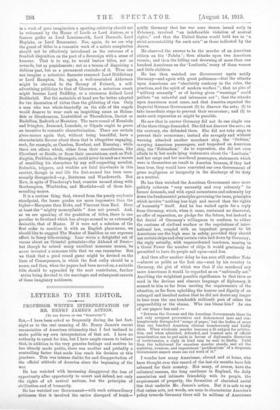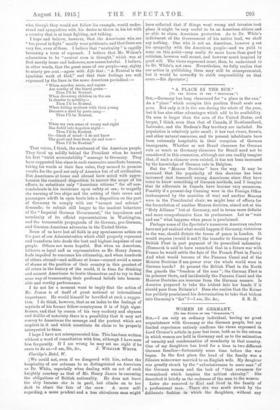LETTERS TO THE EDITOR.
PROFESSOR WHITE'S INTERPRETATION OF MR. HENRY JAMES'S ACTION.
rTo THE EDITOR OF THE " SFECTATOIt."j
have been asked so frequently during the last fort- night as to the real meaning of Mr. Henry James's recent renunciation of American citizenship that I feel inclined to make public my own interpretation of that act. I have no authority to speak for him, but I have ample reason to believe that, in addition to the very genuine feelings and motives he has already made public, there was another and peobably controlling factor that made him reach his decision at this juncture. This was intense dislike for and disapprobation of the official attitude of America since the beginning of the war.
He has watched with increasing disapproval the loss of opportunity after opportunity to assert and defend, not only the rights of all neutral nations, . but the principles of civilization and of humanity.
He has watched our Government—with such extraordinary politeness that it involved the entire disregard of trutisee. notify Germany that her war zone decree, issued early in February, involved "an indefensible violation of -neutral
rights," and that the United States would, hold her to "a strict accountability for such acts" as those indicated by the
decree.
He observed the answer to be the murder of an American citizen on the 'Fa.laba '; then attacks upon two American vessels; and then the killing and drowning of more than one hundred Americans on the Lusitania,' many of them women and little children.
He has then watched our Government again notify Germany—and again with great politeness—that the attacks upon Americans are "absolutely contrary to the rules, the practices, and the spirit of modern warfare "; that no plea of "military necessity or of having given "warnings" could palliate "an unlawful and inhumane act " ; that the attacks upon Americans must cease, and that America expected the Imperial German Government (1) to disavow the acts; (2) to take immediate steps to prevent their recurrence; and (3) to make such reparation as might be possible.
He saw that in answer Germany did not do one single one of the three things demanded. She did-nob disavow the acts; on
the contrary, she defended them. She did not take steps to prevent their recurrence; instead she savagely and without warning attacked another merchant ship, the ' Orduna,' carrying American passengers, and torpedoed an American ship, the 'Nebraskan.' As to reparation, she did not even allude to it, but made lying statements about the Lusitania ' and her cargo and her murdered passengers, statements which were in themselves an insult to America because, if they bad been true, they would have convicted our own Government of gross negligence or incapacity in the discharge of its duty as a neutral.
He has then watched the American Government once more politely reiterate "very earnestly and very solemnly" its former demands, and with equal earnestness and solemnity lay down the fundamental principles governing the issue, principles which involve "nothing less high and sacred than the rights of humanity" itself. And he has waited again for a reply from Germany, which, when it came, contained no disavowal, no offer of reparation, no pledge for the future, but instead a flat denial of Germany's willingness to conform to either
the customs of civilized warfare or the regulations of inter- national law, coupled with an impudent proposal to let Americans use the high seas in safety, provided they should use certain ships and obey certain rules laid down by Germany; the reply actually, with unprecedented insolence, naming to
a Great Power the number of ships it would graciously be permitted to have its people sail upon—and live.
And then after another delay he has seen still another Note —almost as polite as the first one—sent by his country to Germany, the gist of which was that if she murdered any more Americans it would be regarded as an "unfriendly act." Ascribing the weightiest possible significance to that term as used in the devious and obscure language of diplomacy, it seemed to him so far from meeting the requirements of the situation, so far from upholding the honour and dignity of an
outraged and insulted nation that he did not desire any longer to bear even the one hundredth millionth part of either the responsibility or the shame. Who can blame him ? As one of our papers has said :—
" Between the German and the American Governments there lie not only arrogant provocation and dishonoured laws and con- temptuously disregarded scraps of paper,' but the bodies of more than one hundred American citizens treacherously and foully slain, When wholesale murder becomes a fit subject for arbitra- tion, and when admitted, defended, and boasted acts of official assassination can be put aside in favour of diplomatic discussion of irrelevancies, a reply in kind may be sent to Berlin. Until then tho indictment for causeless murder stands, and all the sophistry, evasions, and impertinent justifications' of a desperate Government cannot erase one red word of it."
I wonder how many Americans, abroad and at home, who have thought over this record of the last six months have felt ashamed for their country. Not many, of course, have the collateral reasons, the long residence in England, the daily association and intimate friendship with its people, the acquiretnent of property, the formation of cherished social Melt that underlie Mr. Jamee's action. But it is safe to say that unless acts not words, are soon to characterize America's policy towards Germany there will be millions of Americans who, though they would-not follow his example, Avonld,under- stand and sympathize with his 'desite to throw in his lot with a country that is at least fighting, not talking.
• I hope and believe,- however, that the -Americans. who,are "too prond to fight" mostly wear pettidoats,'and that, there are
very few, even of them, I believe that " neutrality " is rapidly becoming • a term of reproach. I believe that Mr. .• Wilson's
admonition to be "neutral even in thought," which Was at first merely inane and ludicrous, now seems hateful. I believe, in other words, that the great mass of our people,--say, eighty to ninety per. cent.—agree with Life that : "A Neutral is the ignoblest work of • God," and that their feelings are well
expressed by the lines in the same American periodical :— " When murder, arson, and rapine
Are worthy of the laurel green—
Then I'll be Neutral.
When drowning children in the sea Is charter to nobility- - Then I'll be Neutral.
'When killing mothers with their young
Becomes a deed by poets sung—
Then I'll be NeutraL • • • When my own sense of wrong and right Has faded into hopeless night— • Then I'll be Neutral.
Or—blank of mind—I do not know
The good and true from sin and woe—
Then I'll be Neutral."
That voices, I think, the sentiment of the American people.
They lined up solidly behind the President when he issued his first "strict accountability" message to Germany. They have supported him since.in each successive manifesto because, taking his words at their face value, they seemed to promise
results for the good not only of America but of all civilization. But Americans at home and abroad have noted with appre- hension the continued disposition to narrow the scope of his efforts, to substitute only "American citizens" for aZi non- combatants in his insistence upon safety at sea ; to magnify the warning of two ships and the setting of their crews and
passengers adrift in open boats into a disposition on the part of Germany to comply with our "earnest and solemn" demands ; to submit still longer to the insolent behaviour of the "Imperial German Government," the impudence and ' mendacity of its official representatives in Washington, and the treasonable propaganda of its German, pro-German, and German-American advocates in the United States.
Seine of us have lost all faith in any spontaneous action on
the part of our Administration which properly represent and transform into deeds the best and highest impulses of our people. Others are more hopeful. But when an American, hitherto as loyal and as representative as Mr, Henry James, feels impelled to renounce his citizenship, and when hundreds of others abroad—and millions at. home—cannot avoid a sense
of shame at the position of their country in this greatest of all crises in the history of the world, it is time for thinking and earnest Americans to bestir themselves and to try to find some way of transmuting their profound beliefs into honour- able and worthy performance.
• I do not for a moment want to imply that the action of Mr. James is of itself of great national or international importance. He would himself be horrified at such a sugges- tion. I do think, however, that as an index to the feelings of myriads of his former fellow-countrymen, it is of high signi- ficance, and that by reason of his very modesty and shyness and dislike of notoriety there is a possibility that it may not convey to Americans the message and the portent which are
implicit in it and 'which constitute its claim to be Properly interpreted to them.
I hope I have not misrepresented him. This has been written without a word of consultation with him, although I have seen him frequently. If I am wrong he may set me .right if he cares to do so.—I am, Sir, dm., J. .WILLIAX WHITE. Claridges.Rotel, W.
[We Could not, even if we disagreed with him, refuse the hospitality of our columns to so distinguished an American as Dr. White, 'especially when dealing with an act of such knightly courtesy as that of Mr. Henry James in assuming the obligations of British nationality. He does nob leave the ship because she is in peril; but climbs on to her deck to share' the • fate of the, ore*. A more eelf-: regarding, a more prudent and a less..chivalrous man might
have reflected that if .things went wrong and invasion took place it might be very useful ,to be an American citizen and so uble to claim, American . protection, . As to Dr. White's indictment. of.' the Government of his native land, we shall pay nothing. One who is not an American, however g eat his sympathy with • the American people—and we yield to none on this point—may ,easily do more harm than good by criticism, however well meant, and however much inspired by good will. The views' expressed must, then, be understood to be Dr. White's, not ours. Nevertheless, we fully realize that our action in publishing them may still he misrepresented, but it would be cowardly to shirk responsibility on that score.—En. Spectator.]



































 Previous page
Previous page